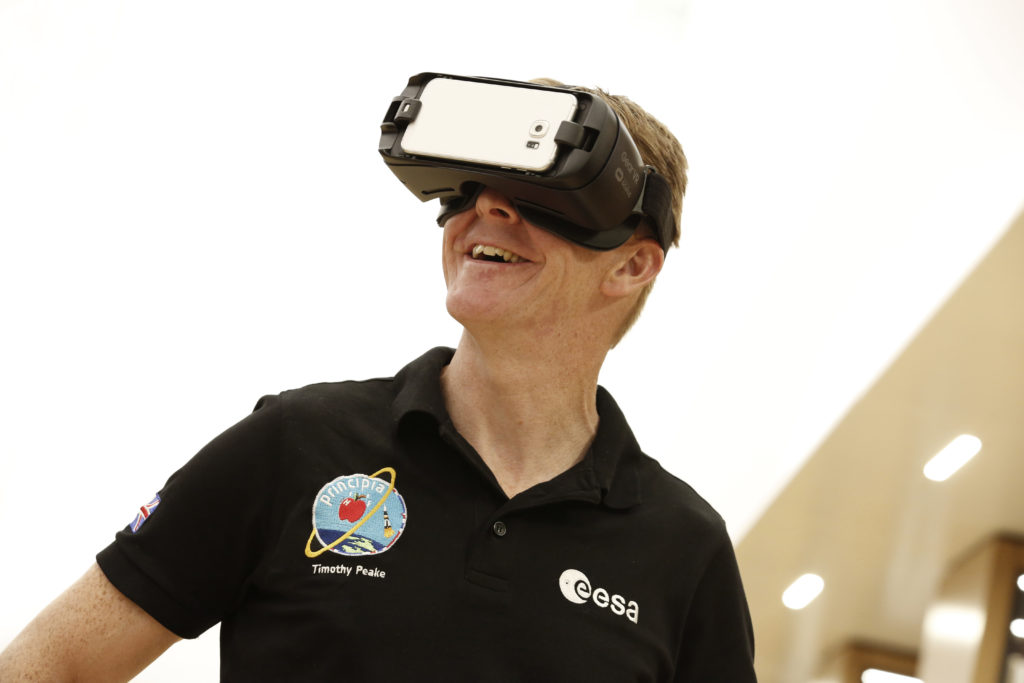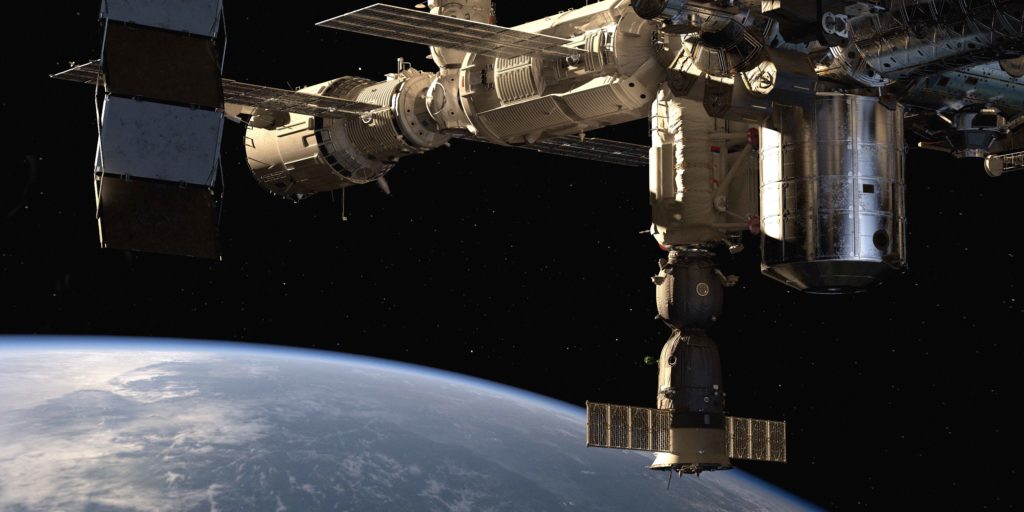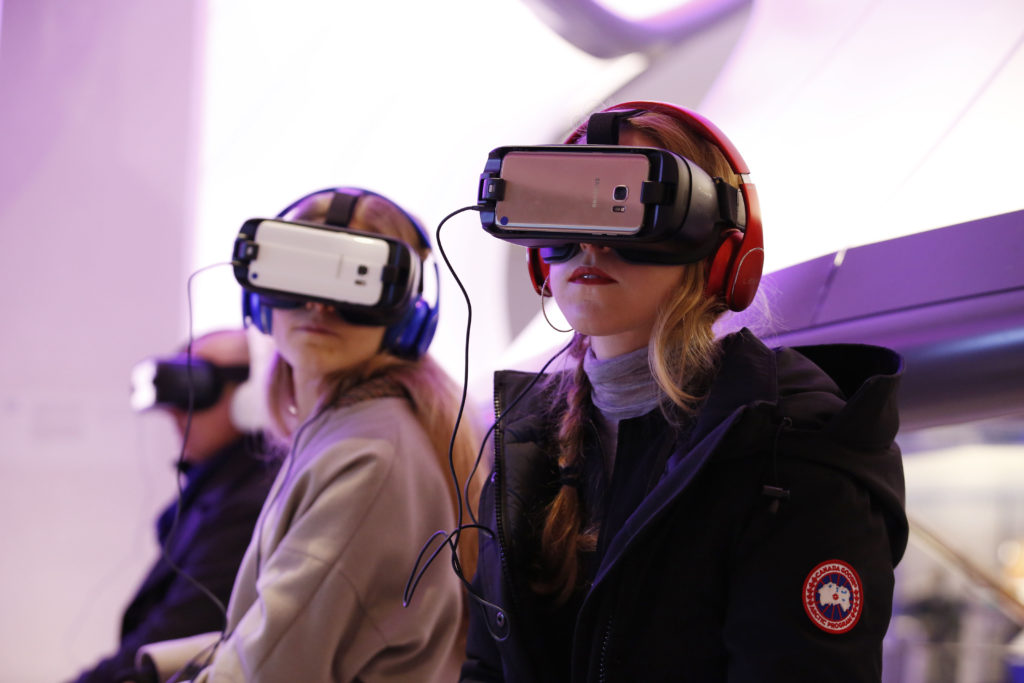Astronaut Tim Peake is set to guide people through a thrilling, high-speed journey back to Earth as an immersive virtual reality experience is unveiled at the Science Museum.
Created by the award-winning Alchemy VR for the Science Museum Group, Space Descent VR will put visitors inside the descent module of a Russian Soyuz spacecraft, with the UK’s first European Space Agency astronaut, for a first-person ride only experienced before by a tiny number of highly-qualified astronauts.
To achieve the extraordinary level of realism offered in the experience, the team consulted leading experts, including Major Peake himself, and then employed the rendering power of 100 computers for a full month. The exquisite final product is delivered to the Museum’s visitors using Samsung Gear VR headsets.
Tim Peake said: ‘It really is breath-taking – and that comes from someone who has spent an awful lot of time using VR systems while training for my first mission. Science Museum visitors are going to experience something that truly is very close to the real thing!‘

Tim Peake uses the Space Descent VR experience © Jody Kingzett / Science Museum
The Science Museum Group’s first permanent virtual reality experience will give the public a unique opportunity to experience the 360° 3D view from inside a Soyuz spacecraft as it makes the dangerous 400km journey back to Earth from the International Space Station, slowing from a speed in orbit of 25,000km per hour to land safely in Kazakhstan.
Anthony Geffen, Founder of Alchemy VR and CEO of Atlantic Productions, said: ‘We are tremendously proud of this exciting experience, which takes visitors on a journey no other technology could achieve. It builds on Alchemy’s leadership in creating ground-breaking location-based virtual reality experiences to inspire and engage people with museum objects.’
The experience is launched less than two months after Peake himself visited the Science Museum to unveil the actual spacecraft – Soyuz TMA-19M – and parachute which returned him safely to Earth from his Principia mission on 18 June 2016.
Acquired for the nation by the Science Museum Group in December 2016, Soyuz TMA-19M is the first flown human rated spacecraft in the UK’s national space technology collection and was unveiled by Tim Peake on 26 January 2017, as he visited the museum and announced that he will go into space for a second time.

Space Descent VR with Tim Peake © Science Museum
Science Museum Group Director Ian Blatchford said: ‘The Science Museum Group is constantly working to revolutionise how our visitors experience and learn about the past, present and future of science and technology, and the ways in which they engage with the magnificent objects in our collection. Space Descent VR with Tim Peake is an innovative and unique offer and I’m confident it will excite and inspire people in equal measure.’
Space Descent VR with Tim Peake has been made possible with support from Samsung and the generous co-operation of Tim Peake and the European Space Agency and will open at the Science Museum on 24 March. Information and tickets are available now at sciencemuseum.org.uk/VR.
–ENDS–

Science Museum visitors using VR -® Jody Kingzett Science Museum
For further information please contact:
Simon Thompson
T: 020 7942 4357
E: simon.thompson@sciencemuseum.ac.uk.

Notes to Editors
About the Science Museum
As the home of human ingenuity, the Science Museum’s world-class collection forms an enduring record of scientific, technological and medical achievements from across the globe. Welcoming over 3 million visitors a year, the Museum aims to make sense of the science that shapes our lives, inspiring visitors with iconic objects, award-winning exhibitions and incredible stories of scientific achievement. More information can be found at sciencemuseum.org.uk. About the Soyuz TMA-19M descent module
● Soyuz TMA-19M carried astronauts Yuri Malenchenko (Commander, Russia), Tim Kopra (Flight Engineer, USA) and Tim Peake (Flight Engineer, UK) to the International Space Station on 15 December 2015 and returned the same crew to Earth on 18 June 2016.
● The crew was part of Expeditions 46 and 47 to the International Space Station.
● The outer surfaces have been charred by temperatures of around 1,500 degrees Celsius experienced during atmospheric re-entry.
● The module weighs approximately 1.5 tonnes.
About the Science Museum Group’s Space Technology Collection
The Space Technology collection is rich in British rocketry and early British and European space science. Significant objects include a Black Knight Gamma 201 engine bay, the R4 Black Arrow launch vehicle (with Prospero satellite flight spare) and the Spacelab-2 X-ray telescope, flown on the Space Shuttle Challenger. Recent acquisitions include the Jet-X telescope, a Eurostar 3000 satellite and an engineering model of the world’s first international satellite, Ariel 1. Significant loaned items include an Apollo fuel cell, J2 and RL-10 engines and the Apollo 10 command module. The Soyuz TMA-19M spacecraft will join the Sokol space suit worn by Britain’s first astronaut as representations of the nation’s evolving human space flight activities. Marking the 110th birthday of legendary Russian space chief Sergei Korolev and the start of the UK-Russia Year of Science and Education, the display of Soyuz TMA-19M celebrates the truly global effort behind space exploration today. Manufactured by RSC Energia for ROSCOSMOS the Russian Space Agency, the Soyuz tells the story of the UK’s first European Space Agency (ESA) astronaut’s journey to the International Space Station (ISS).
About Alchemy VR
Alchemy VR builds on the world class story-telling and technical innovation of Atlantic Productions to create some of the most compelling virtual reality experiences in the world. Alchemy VR’s combination of storytelling and pioneering use of new technologies has created unique and breath taking experiences including David Attenborough’s First Life VR and David Attenborough’s Great Barrier Reef Dive VR. Alchemy VR’s experiences have shown in some of the world’s most prestigious cultural institutions and will be amongst the first virtual reality documentaries to launch on PlayStation VR. VR projects soon to be released by the studio include experiences that take you deep into the Amazon Jungle, across the sands of the Arabian Desert, and into the heart of Dubai. http://www.alchemyvr.com/
Atlantic Productions was founded in 1992 and in this time has won many of the most prestigious awards in television, including the coveted BAFTA award for best specialist factual twice in the last four years (2014 & 2011), eleven Emmy awards, two RTS awards and the best 3D award at Jackson Hole and Wildscreen. Recent productions include INSIDE THE COMMONS (BBC), and DAVID ATTENBOROUGH’S GREAT BARRIER REEF (BBC). www.atlanticproductions.tv
About Samsung Electronics Co., Ltd.
Samsung Electronics Co., Ltd. inspires the world and shapes the future with transformative ideas and technologies. The company is redefining the worlds of TVs, smartphones, wearable devices, tablets, cameras, digital appliances, medical equipment, network systems, and semiconductor and LED solutions. For the latest news, please visit Samsung Newsroom at http://news.samsung.com.
About the Science Museum and Samsung Electronics Co., Ltd
In addition to supporting Space Descent VR, Samsung have partnered with the Science Museum as Principal Sponsors of Mathematics: The Winton Gallery and Founding Sponsors of Digital Lab. In the role of Principal Sponsor, Samsung is supporting Mathematics: The Winton Gallery to increase young people’s interest and enjoyment in maths, as part of their wider Citizenship Programme to help everyone get excited about technology and science. The Digital Lab will use emerging new technologies, including Virtual Reality (VR), 3D scanning and high definition rotational photography, to bring objects from the Museum’s world-class collections to life like never before. For more information visit http://lab.sciencemuseum.org.uk.

